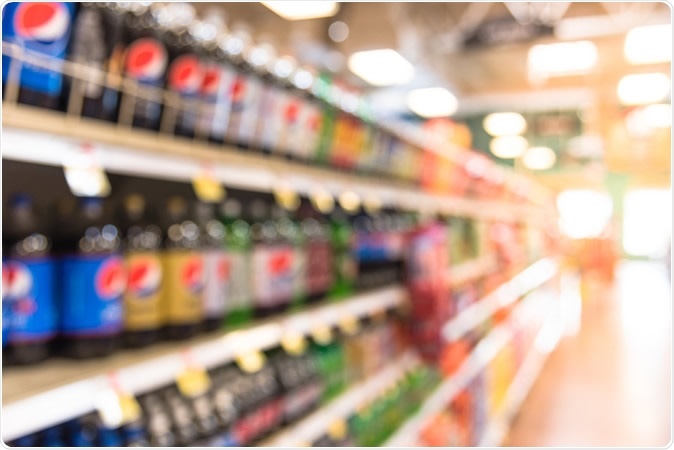French researchers have found that drinking only a small glass of sugary drink per day could lead to a whopping 18 percent increase in the risk of cancer and a 22 percent increase in breast cancers. The team published their study titled, “Sugary drink consumption and risk of cancer: results from NutriNet-Santé prospective cohort,” was published in the latest issue of the British Medical Journal.

Image Credit: Trong Nguyen / Shutterstock
The researchers wrote that sugary drinks are being consumed increasingly and this is raising the disease burden. Sugary drinks are associated with obesity and related problems. Earlier studies have connected sugary drinks to heart disease and diabetes. Obesity is also a risk factor for cancers, explain the researchers. This is in part due to the glucose load on the body that raises the risk of liver and breast cancers and other cancers related to diabetes.
As if the sugar in these drinks was not enough! There are certain chemicals such as 4-methylimidazole in sugary drinks that has been identified by the International Agency for Research on Cancer as carcinogenic or cancer causative. Pesticides in fruit juices and artificial sweeteners like aspartame are also known carcinogens. The researchers add that there has been no clear large population studies that have linked these sugary drinks with cancers and this study attempted to uncover the association.
Mathilde Touvier, the research director of Nutritional Epidemiology Research Team of the National Health and Medical Research Institute said, “Indeed, sugary drinks are convincingly associated with the risk of obesity, which in turn, is recognized as a strong risk factor for many cancer sites. Analyses of this study suggest that overweight and weight gain may not be the only drivers of the association between sugary drinks and cancer risk, but that the relationship observed was also strongly driven by its sugar content” She added, “High sugary drinks consumption is a risk factor for obesity and weight gain and obesity is in itself a risk factor for cancer.”
NutriNet-Sante is a French web-based cohort study that includes French adults over the age of 18 years. Total 101,257 participants were followed up in the research. They were given detailed questionnaires to fill up. This included their lifestyle parameters, body measurements, diet, level of physical activity and also health status. These were recorded at the start of the study and throughout the follow up at intervals of six months. To assess the sugary beverage consumption all drinks containing more than 5% of simple carbohydrates and 100% fruit juices were included in the study. The team also used dual energy X-ray absorptiometry among participants to assess body fat distribution.
On an average the participants were followed up for around 5 years. It was noted than on an average, males consumed an average of 90.3 ml of sugary drinks per day compared to 74.6 ml in women. During this time a total of 2193 cases of cancers were detected of which 693 were breast cancers, 291 were prostrate cancers and 166 were colon and rectum cancers.
Results revealed that there was a positive association between the cancers and excess consumption of the sugary drinks. The association was present for breast cancer but not with prostrate, lung and colon cancers. Results were not significant for sweetened soda but were confirmed for 100% fruit juices. Not surprisingly, there was a strong association between fat deposition and sugary drink consumption. The team explained that fat deposits due to sugar are commonly “visceral fat”. This fat could be linked to cancers of the mouth, stomach, pancreas, liver, gallbladder, breast, ovary, colon, rectum, kidney and prostate as well as the womb.
Touvier explained that this was an observational study and that was a limitation. She said, “We cannot make a causal inference. But we took into account many demographic and lifestyle factors, and the association was still significant.”
Authors of the study conclude, “These data support the relevance of existing nutritional recommendations to limit sugary drink consumption, including 100% fruit juice, as well as policy actions, such as taxation and marketing restrictions targeting sugary drinks, which might potentially contribute to the reduction of cancer incidence.”
“America's leading beverage companies are working together to support consumer' efforts to reduce the sugar they consume from our beverages by providing more choices with less sugar or zero sugar, smaller package sizes and clear calorie information right up front.” Danielle Smotkin spoke for American Beverage Association in response to the results of the study. “That said, America's leading beverage companies are working together to support consumer' efforts to reduce the sugar they consume from our beverages by providing more choices with less sugar or zero sugar, smaller package sizes and clear calorie information right up front,” Smotkin added.
Co-author, PhD student Eloi Chazelas of Sorbonne Paris Cité Epidemiology and Statistics Research Center in a statement said, “Public health authorities encourage limiting sugary drink intake (less than one glass per day). The only beverage that is recommended ad libitum is water.”
Journal reference:
Chazelas Eloi, Srour Bernard, Desmetz Elisa, Kesse-Guyot Emmanuelle, Julia Chantal, Deschamps Valérie et al. "Sugary drink consumption and risk of cancer: results from NutriNet-Santé prospective cohort", BMJ 2019; 366 :l2408, https://www.bmj.com/content/366/bmj.l2408